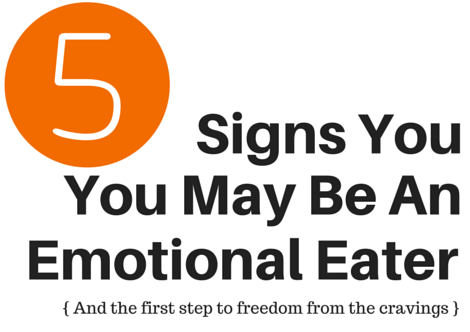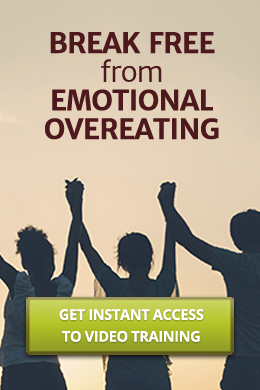Last week’s post about the “typical profile” of an emotional eater painted a clear picture of the type of person I’ve found is most likely to eat emotionally– based on my 20 years of coaching experience. So let’s say you fit that profile… How can you be sure that you’re an emotional eater? Keep reading to find out! Here’s 5 signs you may be an emotional eater.
Emotional eating is one of those things that creeps up on us. One day, we are taking good care of ourselves, eating healthy, and maybe even exercising. The next moment, something sets us off, and we are now eating everything and anything that isn’t nailed down. I’ve been there! And I remember what it feels like:
We know what we’d like to do; we just can’t seem to do it.
So here are a few signs that you may be struggling with emotional eating.
Five Signs You May Be An Emotional Eater
1. Do you tend to over-eat certain types of food over and over again?
We all have our staple foods– those ones we turn to after a bad day or when we just need a boost. When something throws us off or we find ourselves in an emotional rut, we end up going to those staple foods.
Now, like I said, everybody has staple foods. But for emotional eaters, turning to those foods becomes a process that controls us. We look forward to the first few bites, but then it becomes this mechanical eating; we don’t even remember ingesting most of it. And soon we’re just left with that sinking feeling of guilt.
2. Do you find there are certain foods you just can’t help but over-eat? Do you obsess over food throughout the day?
You know those foods… the ones that, if we start with them, then we are in trouble. We know we are better off having nothing, than having something, because just that first taste will set us off and running in circles with the food. What do I eat next? How much can I eat without getting fat? How many pounds can I gain before it’s noticeable? Like I said, our minds start RACING!
And so you take a bite. And what happens next can tell you a lot about whether you’re an emotional eater or not.
What is your thought process now that you’ve indulged? Do you enjoy it for a few seconds before the guilt takes over? Before you start wondering how many minutes you’ll have to exercise to work off what you just ate? What is wrong with ME? If you’re used to guilt like this accompanying every meal, you may be an emotional eater.
3. Do eat primarily for sustenance or for support?
Here’s a key question to ask yourself: “Do you eat primarily because you’re hungry, or do you tend to eat for other reasons?” Now, obviously, there are many other reasons that we eat from time to time– to support people who cook for us, to celebrate with friends, and to give us fuel for the day, just to name a few. But, as a principle:
Do you tend to eat mainly for SUSTENANCE or mainly for SUPPORT? If it’s the latter, I’d encourage you to take some time to really examine your eating habits. Food is for sustenance, and when we allow it to fill other roles it tends to take over our lives.
4. Are you hungry with your stomach, or is your hunger an intense mental stress?
Again, this is a question that you’ll understand if you’re battling emotional eating. See, when I was trapped in emotional overeating, hunger wasn’t about pains in my stomach; instead, it was my never-ending battle with an enduring thought: “Food will make this problem situation better.”
But here’s the thing: Even when we eat, we don’t experience relief from the pain of emotional eating. Why? Because it’s EMOTIONAL– it’s not PHYSICAL!
5. Do you feel like you’re on a never-ending rollercoaster of weight loss and yo-yo dieting?
If you’ve tried everything to shed excess weight– natural cures, exercise regimens, extreme diets– and you’re still not seeing a difference, there may be something deeper going on. Over my decades of counseling experience, I’ve seen it time and time again: Clients searching for a needle in the weight loss haystack– only to realize that the solution lies within themselves.
Make no mistake– the road to a healthy relationship with food is not an easy one. But here’s what I’ve found: when you are taking the steps to challenge the core reasons why you overeat– the emotions behind your actions– those excess pounds start to melt off.
The First Step to Overcoming Emotional Eating
If you’ve identified with any of the signs I listed above, you are not alone! Many of us feel very isolated and that we don’t have someone to talk to who really understands. People seem to say, “Can’t you just put down the cake or go for a run?” Obviously, they don’t understand the struggle.
Being overweight and being an emotional over-eater are not the same thing. For an emotional eater, the weight is just a byproduct of unhealthy thinking patterns. So the first step is identifying those unhealthy thought patterns– the reasons you overeat in the first place.
Are you ready to uncover those unhealthy thought patterns in your life? This process has helped literally thousands of people like these overcome their emotional attachments to food. And you can start this process, too, by signing up for our free 3-Part Video Series.








